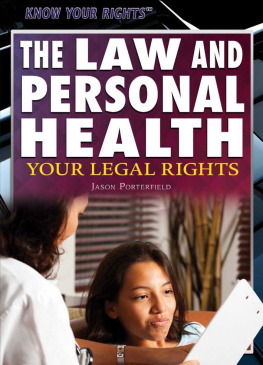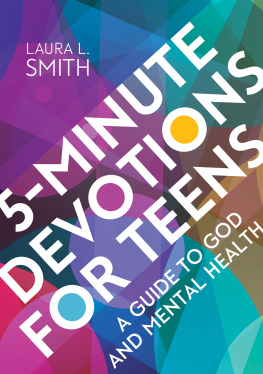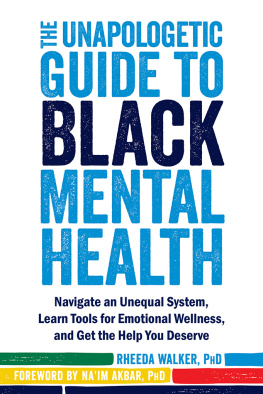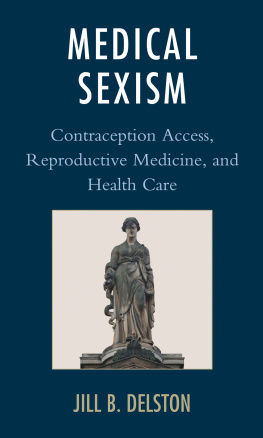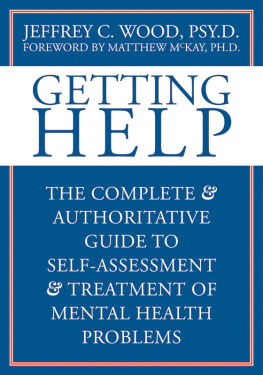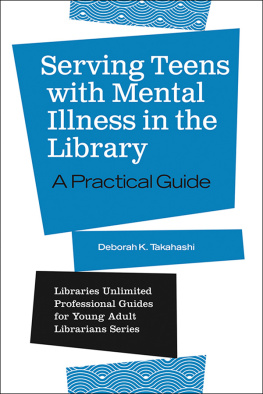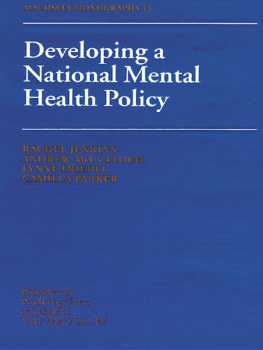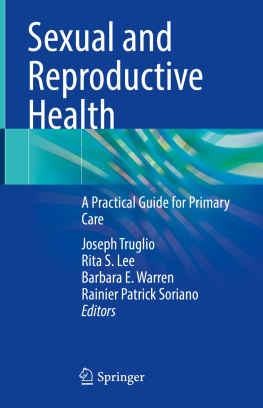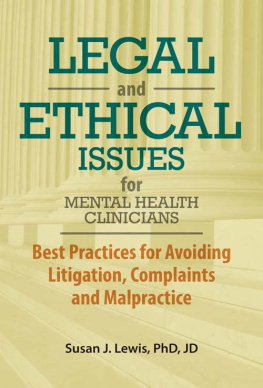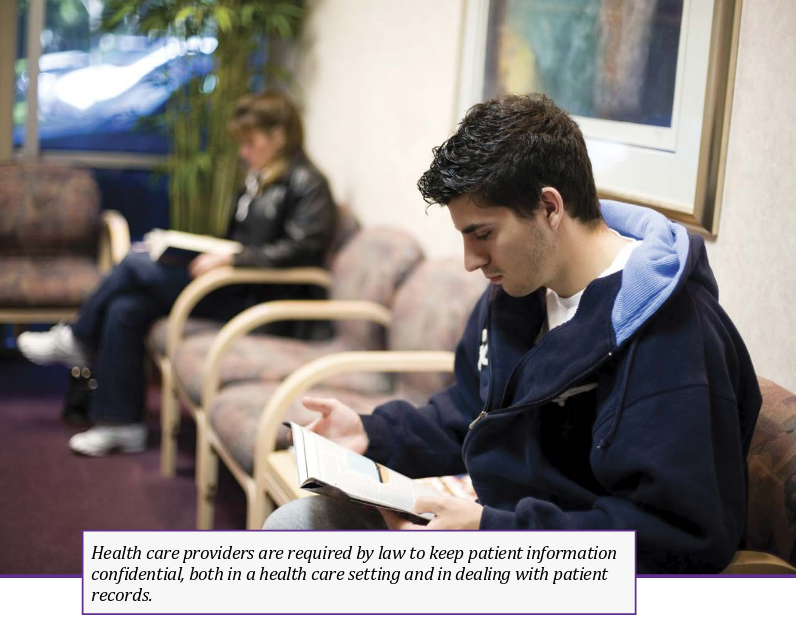Published in 2016 by The Rosen Publishing Group, Inc. 29 East 21st Street, New York, NY 10010
Copyright 2016 by The Rosen Publishing Group, Inc.
First Edition
All rights reserved. No part of this book may be reproduced in any form without permission in writing from the publisher, except by a reviewer.
Expert Reviewer: Lindsay A. Lewis, Esq.
Library of Congress Cataloging-in-Publication Data Porterfield, Jason, author.
The law and personal health : your legal rights/Jason Porterfield.
pages cm.(Know your rights)
Includes bibliographical references and index.
ISBN 978-1-4777-8052-7 (library bound)
ISBN 978-1-4777-8614-7 (pbk.)
ISBN 978-1-4777-8615-4 (6-pack)
1. Public health lawsUnited StatesJuvenile literature. 2. Informed consent (Medical law)United StatesJuvenile literature. 3. Confidential communicationsPhysiciansUnited StatesJuvenile literature. I. Title.
KF3775.P67 2016 344.730321dc23
Manufactured in the United States of America
CONTENTS
INTRODUCTION
A lma McGowen was a new girl at school when she enrolled in the Spencer County School District in Louisville, Kentucky. It was 1992, and she was in sixth grade. From the second day, things started to go wrong for Alma. A first grader shouted that she was that German gay girl. Alma complained to the school counselor, who talked to students about the importance of acceptance. But the harassment continued. A high school student on the school bus used sexually explicit language when talking to Alma. She complained again, and the boy was kicked off the bus for a few days. When he returned, he continued to target Alma.
Over the next couple of years, the harassment grew worse. Students taunted Alma or touched her inappropriately in almost every class. Once, a group of boys surrounded her and started to tear at her clothes. One of the boys began to take his pants off, saying that he was going to have sex with her. Alma complained numerous times to school officials, teachers, and youth advocates. Even when they spoke to her tormenters, the harassment only grew worse afterwards.
In 1995, Alma filed a formal complaint stating that the sexual harassment violated her right to receive education opportunities. She was diagnosed with depression, and she eventually withdrew from school. In 1998, Alma's case went to trial. A jury ruled in her favor and awarded her $220,000. An appeals court confirmed the verdict, finding that the sexual harassment had been severe and pervasive, that the school district had been aware of the harassment, and that it had shown deliberate indifference to the circumstances.
Harassment is a civil rights issue since it can affect people's access to certain privileges regardless of factors such as sex or race. But it is also a health issue when people who experience harassment become depressed or experience other psychological and physical health consequences. High-profile cases such as Alma's have led to many schools adopting inclusive policies that combat harassment. Alma knew her rights concerning harassment, and the courts backed her up.
As a teenager, you have certain rights concerning a broad range of personal health issues. But, as a minor, you're still required to have the consent of a parent or guardian for most medical decisions. There are some exceptions. These concern issues that teens may prefer to keep private, such as reproductive health care, substance abuse counseling, and mental health treatment. When you're facing a health issue for which you'd prefer to receive confidential treatment, it might seem like you have no place to turn for help. If you're aware of your legal rights concerning your health, the knowledge can make a daunting situation seem much more manageable.
CHAPTER 1
CONSENT, CONFIDENTIALITY, AND PRIVACY
A s a young adult, you may be beginning to make your own health care decisions for the first time. It's important that you start out by establishing good habits in caring for your well-being. If you have a concern about a health issue, you should see a doctor or other medical professional.
But many teenagers are reluctant to take their problems to a doctor, and one of the main reasons is a concern about confidentiality. What if friends at school found out about an embarrassing medical condition? Or employers or parents? Teens may be unwilling to seek help for issues such as sexually transmitted diseases, depression, or substance abuse if it meant that others might find out. Yet all of these are urgent health matters that should be addressed by a medical professional.
Patient confidentiality forbids medical service providers from sharing personal health information without the patient's consent. But the law only fully applies to adultspeople age eighteen or older. For a minor, parents are responsible for making most medical decisions and have the right to access most medical information.
MAKING DECISIONS ABOUT YOUR HEALTH
Before a patient receives medical care, he or she must give consent for the treatment or process. By giving consent, the patient indicates that he or she understands the information about the treatment and authorizes the doctor to administer medical care. For serious procedures, a patient must give
written informed consent. During the informed consent process, health care providers provide a full explanation of the treatment and risks. The patient asks questions and weighs options before signing the consent form.
A patient must have the capacity to understand the information in order to grant consent. If an individual is not competent to make decisions concerning medical care, another adult will make the decisions on his or her behalf. For example, parents make the medical decisions for young children. In general, minors, those under the age of eighteen, must have parental consent in order to receive health care services.
As a teenager, you must have a parent or guardian's consent for most medical treatments. In general, both biological and adoptive parents have full right to consent to medical treatment for their children. In some situations, however, the issue of granting legal consent can be complicated. Some parents or guardians may not have the right to grant medical consent for their children. These include divorced parents without legal custody, stepparents who have not adopted their stepchildren, and foster parents. The matter of medical consent is even more complex for minors involved in the juvenile justice system. In such cases, medical consent may be granted by a social worker, a probation officer, a juvenile court official, or a representative of certain other social service agencies. Specific laws concerning consent vary from state to state.
Under some circumstances, teenagers may be granted consent rights. Legally emancipated minors can give consent. So can teenagers who are married or serving in the armed forces. Minors who are parents have the right to grant consent for their children, and in some states, they can make medical decisions for themselves as well.

